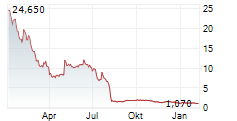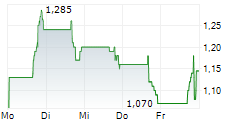SUNRISE-PD evaluating the Company's anti-inflammatory, insulin-sensitizing candidate bezisterim in patients with Parkinson's disease who have not been treated with carbidopa/levodopa
SUNRISE-PD is one of very few clinical trials for a Parkinson's disease treatment to incorporate a decentralized approach option to allow for remote participation
Patient enrollment has commenced, with recruitment being supported by The Michael J. Fox Foundation, Davis Phinney Foundation and The Parkinson's Foundation
Topline data anticipated in Late 2025 or Early 2026
CARSON CITY, Nev., April 16, 2025 (GLOBE NEWSWIRE) -- BioVie Inc., (NASDAQ: BIVI) ("BioVie" or the "Company") a clinical-stage company developing innovative drug therapies for the treatment of neurological and neurodegenerative disorders and advanced liver disease, today announced that patient enrollment is now open for the Phase 2 SUNRISE-PD clinical trial evaluating the safety and efficacy of bezisterim (NE3107) on motor and non-motor symptoms in patients with Parkinson's disease (PD) who haven't been treated with carbidopa/levodopa. The first patient in the trial has been enrolled, and the Company anticipates topline data to be available in late 2024 or early 2025.
Parkinson's disease is a progressive neurodegenerative disease most often characterized by tremors, muscle rigidity, slowness of movement, postural instability, and difficulties with speech.1 Compelling evidence implicates inflammation and insulin resistance in the initiation and progression of the disease - likely both due to their respective roles in dopamine dysfunction in the brain2-6 and neurodegeneration. Current therapeutic approaches provide only symptomatic relief, but do not modify disease progression.
"Based on promising findings from our earlier Phase 2a trial in patients with moderate to severe symptoms of Parkinson's disease, we've designed the SUNRISE-PD trial to explore bezisterim's impact at an earlier stage with patients needing to go on therapy for the first time to manage their symptoms," said Cuong Do, BioVie's President and CEO. "We believe that together, these two trials have the potential to illustrate the applicability of an anti-inflammatory, insulin-sensitizing drug candidate in treating both early and advanced Parkinson's disease along with providing a foundation for registrational disease-progression studies. Additionally, SUNRISE-PD is to our knowledge one of only a handful of trials to evaluate a potential treatment for Parkinson's disease while allowing patients to participate remotely through a decentralized trial site, broadening access for this focused study population."
SUNRISE-PD is a Phase 2b, multicenter, randomized, double-blind, placebo-controlled trial with a hybrid decentralized design that will last 20 weeks from the initial screening phase to the safety follow up. During the 12-week double-blind phase, approximately 60 patients will be randomized 1:1 to receive either 20 mg of bezisterim or placebo twice-daily.
As part of the trial, patients may participate either completely from their home or at a clinical site. At-home participants will be visited by study nurses who will complete study assessments with the assistance of a neurologist who will attend the visit remotely by video and supervise administration of a modified MDS-UPDRS Part III examination, which will be recorded for review and scoring by a central rating committee. If the trial's results are positive, participants may be eligible to enter a longer-term, open-label safety study.
"A growing body of research suggests that chronic inflammation and insulin resistance play a critical role in the onset and progression of Parkinson's disease. By targeting these two underlying mechanisms, bezisterim may offer a novel therapeutic approach distinct from current treatments, such as levodopa, which may be associated with complications like motor fluctuations and dyskinesia," said Mark Stacy, MD, Professor of Neurology at Medical University of South Carolina and senior clinical advisor of the SUNRISE-PD trial. "The SUNRISE-PD trial will provide valuable insights into how an anti-inflammatory, insulin-sensitizing treatment may impact motor and non-motor symptoms in early Parkinson's disease."
"The Parkinson's Foundation is pleased to see BioVie shares our goal of increased patient access to clinical trials with their recruitment for the SUNRISE-PD trial, which allows patients to participate remotely through a decentralized trial site in addition to standardized sites," said James Beck, PhD, Chief Scientific Officer of the Parkinson's Foundation. "By offering a remote participation option, this study is expanding access to clinical research for more people living with Parkinson's and actively lowering the all-too-common barrier of geography to research participation. We look forward to seeing how this approach can improve outcomes for all who live with Parkinson's disease."
BioVie announced in November 2024 that the SUNRISE-PD clinical trial is fully funded. Enrollment in the trial is being supported by leading advocacy groups in the field, including The Michael J. Fox Foundation, Davis Phinney Foundation and The Parkinson's Foundation. People with newly diagnosed Parkinson's disease who have not been prescribed levodopa or other dopamine receptor agonists may meet qualification criteria and can visit www.sunrisePD.com to learn more.
About Parkinson's Disease
Parkinson's disease (PD) is a progressive neurodegenerative disorder that primarily affects movement. It is characterized by the loss of dopamine-producing neurons in the substantia nigra, a region of the brain critical for motor control. Core symptoms include tremors, muscle rigidity, bradykinesia (slowness of movement), postural instability, and difficulties with speech.1,7 Non-motor symptoms, such as cognitive impairment, mood disorders, and autonomic dysfunction, also significantly impact patients' quality of life.8 In the early stages, symptoms are often mild and may include subtle tremors, slight movement difficulties, and changes in handwriting or facial expressions. As the disease progresses, motor symptoms become more pronounced, leading to difficulties with balance, speech, and daily activities, often requiring full-time care in later stages.9
Since the 1960s, when dopamine's critical role in Parkinson's disease was first identified, levodopa has remained the cornerstone of treatment, providing significant symptom relief by replenishing dopamine levels in the brain.10-11 However, long-term use is associated with complications such as motor fluctuations-where symptom control becomes less stable-and dyskinesia, involuntary movements that can become debilitating.12-14
Emerging research highlights the role of chronic inflammation and insulin resistance in the onset and progression of Parkinson's disease. Neuroinflammation, driven by activated microglia and elevated levels of pro-inflammatory cytokines, contributes to oxidative stress and accelerates neuronal degeneration.2-4 Additionally, insulin resistance, which impairs the brain's ability to regulate glucose metabolism, has been linked to increased neurodegeneration and worsening motor symptoms.5-6 These metabolic dysfunctions create a harmful cycle that exacerbates disease progression, underscoring the potential of anti-inflammatory and insulin-sensitizing therapies as new avenues for treatment.
About Bezisterim
Bezisterim (NE3107) is an orally bioavailable, BBB-permeable, insulin-sensitizer that is also anti-inflammatory. In addition, it is not immunosuppressive and has a low risk of drug-drug interaction. By binding to ERK and selectively modulating NF?B activation and TNF-a production, BioVie believes that bezisterim may offer clinical improvements in several disease indications, including PD, AD and long COVID.
BioVie has conducted and reported efficacy data on its Phase 3 randomized, double-blind, placebo-controlled, parallel-group, multicenter study to evaluate bezisterim in patients who have mild-to-moderate AD (NCT04669028). Results of a Phase 2 investigator-initiated trial (NCT05227820) showing bezisterim-treated patients experienced improved cognition and biomarker levels were presented at the Clinical Trials on Alzheimer's Disease (CTAD) annual conference in December 2022. An estimated six million Americans suffer from AD. A Phase 2 study of bezisterim in PD (NCT05083260) has been completed, and data presented at the AD/PD 2023 International Conference on Alzheimer's and Parkinson's Diseases and related neurological disorders in Gothenburg, Sweden in March 2023 showed significant improvements in "morning on" symptoms and clinically meaningful improvement in motor control in patients treated with a combination of bezisterim and levodopa vs. patients treated with levodopa alone, and no drug-related adverse events.
In long COVID, bezisterim has the potential to reduce neurological symptoms including fatigue and cognitive dysfunction. Persistently circulating viral spike proteins are believed to trigger TLR-4 driven activation of NF?B and the subsequent expression of inflammatory cytokines (IL-6, TNF, IFNg).
About BioVie Inc.
BioVie Inc. (NASDAQ: BIVI) is a clinical-stage company developing innovative drug therapies for the treatment of neurological and neurodegenerative disorders (long COVID, AD and PD) and advanced liver disease. In neurodegenerative disease, the Company's drug candidate bezisterim inhibits inflammatory activation of extracellular signal-regulated kinase and the transcription factor nuclear factor-?B, and the associated neuroinflammation and insulin resistance but not ERK and NF?B homeostatic functions (e.g., insulin signaling and neuron growth and survival). Both neuroinflammation and insulin resistance are drivers of AD and PD. Persistent systematic inflammation and neuroinflammation are key features in patients with neurological symptoms of long COVID. In liver disease, the Company's Orphan drug candidate BIV201 (continuous infusion terlipressin), with FDA Fast Track status, is being evaluated and discussed with guidance received from the FDA regarding the design of Phase 3 clinical testing of BIV201 for the reduction of further decompensation in participants with liver cirrhosis and ascites. The active agent is approved in the U.S. and in about 40 countries for related complications of advanced liver cirrhosis. For more information, visit www.bioviepharma.com.
Forward-Looking Statements
This press release contains forward-looking statements, which may be identified by words such as "expect," "look forward to," "anticipate" "intend," "plan," "believe," "seek," "estimate," "will," "project" or words of similar meaning. Although BioVie Inc. believes such forward-looking statements are based on reasonable assumptions, it can give no assurance that its expectations will be attained. Actual results may vary materially from those expressed or implied by the statements herein due to the Company's ability to successfully raise sufficient capital on reasonable terms or at all, available cash on hand and contractual and statutory limitations that could impair our ability to pay future dividends, our ability to complete our pre-clinical or clinical studies and to obtain approval for our product candidates, our ability to successfully defend potential future litigation, changes in local or national economic conditions as well as various additional risks, many of which are now unknown and generally out of the Company's control, and which are detailed from time to time in reports filed by the Company with the SEC, including quarterly reports on Form 10-Q, reports on Form 8-K and annual reports on Form 10-K. BioVie Inc. does not undertake any duty to update any statements contained herein (including any forward-looking statements), except as required by law.
References
1 Cleveland Clinic. Parkinson's Disease. Last reviewed: 2022 Apr 15.
2 Jurcau A, Andronie-Cioara FL, Nistor-Cseppento DC, et al. Int J Mol Sci. 2023;24:14582.
3 Pajares M, Rojo AI, Manda G, et al. Cells. 2020;9:1687.
4 Isik S, Kiyak BY, Akbayir R, et al. Cells. 2023;12:1012.
5 Zagare A, Hemedan A, Almeida C, et al. Mov Disord. 2025;40(1):67-76.
6 Ruiz-Pozo VA, Tamayo-Trujillo R, Cadena-Ullauri S, et al. Nutrients. 2023;15(16):3585.
7 Jankovic J. J Neurol Neurosurg Psychiatry. 2008;79(4):368-376.
8 Postuma RB, Berg D, Stern M, et al. Mov Disord. 2015;30(12):1591-1601.
9 Kalia LV and Lang AE. Lancet. 2015;386(9996):896-912.
10 Hornykiewicz O. Angew Chem Int Ed. 2002;41(17):2934-2941.
11 Olanow CW, Obeso JA and Stocchi F. Lancet Neurol. 2006;5(8):677-687.
12 Ahlskog JE and Muenter MD. Mov Disord. 2001;16(3):448-458.
13 Espay AJ, Morgante F, Merola A, et al. Ann Neurol. 2018;84(6):797-811.
14 Cilia R and Akpalu A. J Neural Transm. 2020;127(5):889-916.
For Investor Relations Inquiries:
Contact:
Bruce Mackle
Managing Director
LifeSci Advisors, LLC
bmackle@lifesciadvisors.com
For Media Inquires
Melyssa Weible
Managing Partner, Elixir Health Public Relations
Ph: +1 201-723-5705
mweible@elixirhealthpr.com



